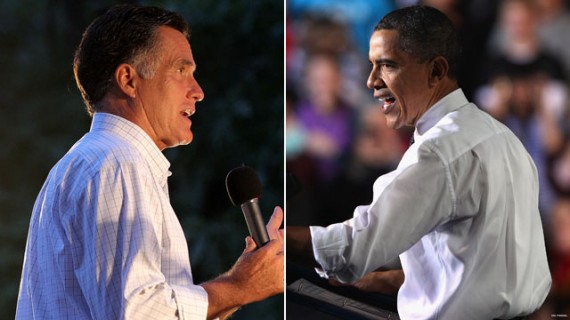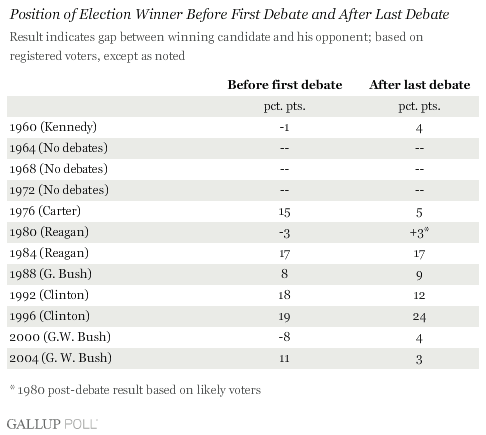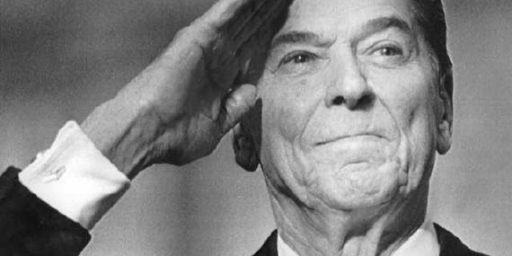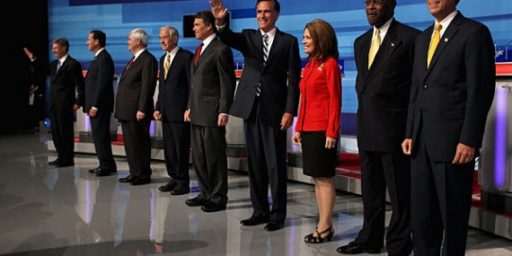Do Presidential Debates Even Matter?
There's little evidence that Presidential debates can be game changers.
With just about two and a half days left until President Obama and Mitt Romney face off against each other in the first of three Presidential debates, the media is breathlessly telling us that this is a “make or break” moment for the former Massachusetts Governor, the debate expectations game is in full force. The Romney campaign, the experts tell us, needs to make a clear breakthrough on Wednesday night or it will find itself falling even deeper into the poll spiral that they’ve been in since the conventions ended. The President, meanwhile, needs to give the voters a reason to re-elect him notwithstanding the state of the economy according to the talking heads on cable and the Internet.
It’s understandable that the political press would have an interest in hyping the importance of these debates. After all, they are likely to provide hours upon hours of things to talk about throughout the month of October, not to mention viewer attention and page views. The question, though, is whether the debates really matter as much as the pundits tell us they do. In support of the argument that they do, people will often cite the Nixon-Kennedy debates in 1960, but, of course, those debates were far different from the controlled and sterile atmosphere that has come to embody Presidential debates ever since the Commission On Presidential Debates took over the process in 2008. The format of the debates is such that there’s very little actual “debating” between the candidates, instead what we get are 2-3 minutes of platitudes followed by a response, then we move on to the next question. Both candidates will have been through hours of preparation and rehearsal prior to walking out on that stage in Denver, and they will have been pre-programmed with response lines to be delivered at the appropriate moment. This isn’t Nixon-Kennedy 1960, and it certainly isn’t Lincoln-Douglass 1858. The entire format is designed to ensure that both candidates are as comfortable and controlled as possible, and that the voters watching only get the message that their campaigns want them to deliver.
Gwen Ifill, who moderated the Vice-Presidential debate in 2008, had a piece in The Washington Post yesterday debunking what she says are many myths about the Presidential debates:
1. Voters use debates to decide.
For many voters, televised presidential debates serve to focus the mind. Seeing the men who would be president — yes, always men, so far — face off helps viewers finally choose a side.
But debates are only part of the American voter’s political diet. Like 30-second ads or stump speeches, they do as much to confirm impressions as to alter them. Think back to some memorable debate moments. Did George H.W. Bush glancing at his watch really persuade people to vote for Bill Clinton, or did it confirm the worst suspicions of those already leaning away from him? Did Lloyd Bentsen dismissing Dan Quayle as “no Jack Kennedy” lose the election for Michael Dukakis, or did it speak to an existing worry that Bush lacked the judgment to pick a No. 2 who could assume the presidency?
Minds were already made up. Gallup polls going back decades show precious little shift in established voter trends before and after debates. The major exception: 1960, when Gallup suggests that Richard Nixon’s lackluster, sweaty performance against John F. Kennedy moved a dead-heat campaign into the Democrats’ column — and that’s where it stayed.
But, as I already noted, 1960 was an exception. First of all, it was the first time in American history that a mass audience had a chance to see the two major party candidates for President standing side by side on a stage debating the issues of the day. Second, as I said, the debate format in 1960 was far different from what we see today. Indeed, after the 1960 debates there was not another televised Presidential debate until President Ford debated Jimmy Carter in 1976, and in 1980 there was only one debate between the two major party candidates because President Carter had refused to participate in a debate that inclued Independent candidate John Anderson as well as Ronald Reagan. So, I think we need to look at the 1960 election as something of an outlier if we’re trying to study the impact of debates on elections. Besides that, it isn’t like the 1960 debates resulted in a landslide given that John F. Kennedy only beat Richard Nixon by ~120,000 votes.
Ifill points out another debate myth:
4. He who zings, wins.
This one is almost too easy to debunk. Lloyd Bentsen. Lloyd Bentsen. Lloyd Bentsen.
In the 1988 vice presidential debate, Quayle was apparently miffed at being asked for the third time by the moderators whether he was prepared to be president. The 41-year-old candidate replied that he had as much experience in the Senate as John F. Kennedy had when he ran for president in 1960.
When Judy Woodruff turned to Bentsen for his reply, he pounced. “Senator, I served with Jack Kennedy,” he said sternly. “I knew Jack Kennedy. Jack Kennedy was a friend of mine. Senator, you’re no Jack Kennedy.” The audience hooted. The exchange went down in history.
Probably the other most memorable zinger fell in 1984 from the lips of Ronald Reagan, then 73 and debating Walter Mondale, a man 17 years his junior. In their first debate, Reagan seemed at times vague and confused. Not so in their second meeting: “I will not make age an issue of this campaign,” he said. ”I am not going to exploit for political purposes my opponent’s youth and inexperience.” Zing.
But did either exchange shift the outcome of the election? Reagan won 49 of 50 states; Mondale only his home state of Minnesota and the District of Columbia. This probably had more to do with the Democrat’s pledge to raise taxes than with the debate smackdown. As for the Dukakis-Bentsen ticket, it managed to turn a 17-point post-convention lead into an Election Day drubbing.
This one calls into question the reports over the weekend that Mitt Romney has spend the better part of the summer rehearing “zingers” he can use in debates with the President. Not only is there little evidence that these zingers actually mange to have any impact on the race, but there’s always the risk that any joke a candidate tries to make will end up bombing. If that happens, then it ends up dominating the news coverage the next day, likely to the disadvantage of the candidate who bombed. So, while I really don’t care about Romney’s fortunes in the debates, I would think that the “zingers” story may be disinformation.
As far as the actual numbers go, Miranda Green notes that there’s little evidence that debates have a major impact on the polls
A 2008 Gallup study found that between 1960 and 2004, there were only two years where debates made a difference in actual votes. Instead, the most common outcome of the presidential debates is a slight popularity bump. But that bump doesn’t necessarily translate into votes.
“They sometimes have a short-term effect, a bounce in response to the debates, but at the end of the day there often is not much of an effect,” says Robert Erikson, author of The Timeline of Presidential Elections.
Data from the Gallup study also saw no direct correlation between the winner of each debate and the winner of the presidency. The 2004 Kerry vs. Bush debate was cited as an example. Kerry was considered the victor of all three showdowns, but still lost the election.
There are numerous factors responsible for the disparity between who “wins” the debates and who wins the election. Political scientists say one of the biggest reasons is that those who are watching the debates already have their minds made up.
“By [debate] time voters have pretty much picked their candidates,” says Erikson. “Some are undecided, but they are probably not paying attention…People who are political and have a party affiliation are hard to dislodge by the debates. And those rooting for their favorite candidate, even if he is doing poorly, aren’t necessarily going to change their mind.”
Even if a large number of open-minded, undecided voters watch the debates, history shows that the events are typically lackluster and therefore unlikely to influence a person’s interpretation of a candidate.
“Usually the candidates fight to a draw. They are well prepared and the format of the debates gives them equal time,” Sides says. “So it’s hard in that context to have a stunning victory or a terrible defeat.”
Jazz Shaw suggests that Green may be among those trying to downplay the importance of the debates due to political preferences. That’s entirely possible, but the Gallup study that she links to, makes it fairly clear that, at least based on their data, Presidential debates have only changed the course of an election on two occasions:
As Gallup notes, the only two elections where the debates appear to have had a major impact on the course of the election were in 1960 and 2000. Even the 1980 election, the one where many people believe falsely that Reagan won the election in his one and only debate with President Carter, doesn’t fall into this character. So, of the nine Presidential elections with debate between 1960 and 2004, debates only had a major impact in two occasions. The 2008 debates certainly don’t fall into the “major impact” category given the fact that then Senator Obama was leading John McCain well before they met in their first debate. So that’s ten rounds of debates, only two of which had a major impact on the election. 20%, that’s not exactly a persuasive argument for the importance of these debates in the contest of a Presidential Election.
An additional factor in all of this, of course, is the fact that we now live in a world where people in large segments of the country are eligible to vote early. Indeed, according to some estimates as many as 35% of the people who will vote in the 2012 election will vote early in one way or another. For these people, the debates will be entirely irrelevant. None of this is good news for Mitt Romney, of course. These debates represent his last chance to turn this election around after all. If it turns out that they aren’t going to have the impact that his campaign hopes, than the chances that he can turn the polls around and pull of a victory on November 6th become slimmer and slimmer.








Shhhh, why let reality get in the way of a good yarn? Why burst bubbles? Sometimes with the spaced out chattering classes the best thing to do is to let them work out their issues by hyperventilating over stuff, e.g. the debates.
In any event, I for one haven’t watched a presidential debate in decades and I don’t plan this year to break that trend. But out of sheer morbid curiosity I do plan to watch the veep debate. For similar reasons to why I rubberneck at car crashes.
Debates may not matter generally, but if you’re a candidate with a struggling campaign and a secret tape dogging your every step, you better hope they matter.
The debates don’t really matter to me since I filled out my absentee ballot and stuck it in the mail this morning. For me the election is over, save for the noise that I’ll hear in the background as I watch my morning news.
Debates may help firm up the votes of people who were leaning but still persuadable to other side. I don’t think Clinton had it in the bank in 1992 when he went into the debates, but he may have sealed it there. So I think the debates may still have mattered in years like 1976, 1980, and 1992. Today, I’m not as sure, since there seem to be fewer persuadable voters.
The references to Quayle don’t belong here, VP debates are a different animal.
I’m being reminded of the recent Republican primary. The press managed to keep the story alive for about three months after the outcome had become obvious. The fact is that “no drama” Obama wins the debate just by providing no drama; while Mitt Romney has to produce a breakthrough, which, as Doug points out, would be unprecedented.
I haven’t watched a debate in years, but I may make an exception Wednesday, even though I don’t expect any drama. There is the possibility that Mitt will start flailing, maybe switch a couple of positions in mid-debate.
Sure they matter. At the margins, probably.
The debates would not matter if Romney had found a break-through issue. At this point Pundits are doing him a favor in not counting him out. So they invent the next hail Mary moment for him. It was the convention. Now it’s the first debate.
If he fails the press won’t pack up and go home. They’ll invent a new last ditch plan for him.
The thing to note is that this isn’t an anti-Romney bias. To make the news cycles work, to keep viewership up, they’ve got to be absurdly optimistic about Romney’s chances.
lol, on the other hand. If Romney wants to win, now would be a good time.
Romney’s biggest problem is he comes off as a robotic plutocrat. That’s who he is and I’m not sure there is anything he can do to change that. He is also going to have to control his temper.
Newton’s first law: an object continues to do whatever it happens to be doing unless a force is exerted upon it.
In the case of the Presidential race that force could be Middle-East unrest, a European financial crisis, another Romney Kinsley-Gaffe, or some other un-foreseen event.
The only thing we know for sure that is going to happen between now and November 6th…is the debates.
http://www.foodnetwork.com/recipes/paula-deen/grandma-pauls-caramel-corn-recipe/index.html
BTW, if you are going to “debates don’t matter,” why stop there? Why not go all the way to:
This Election Is Already Over – Obama Has Won
I am not sure the debates make a huge difference-and I doubt they will especially in this election where most people seem to have their minds made up.
One thing notable in the polls is just how consistent they are-most people know who they are voting for and there is very little that is going to change their minds.
One thing I note from debates past is that generally people who lean towards one candidate will almost always see that candidate in the best light following the debates-their guy always wins even if he didn’t. Not to mention in the current “short speech but not really a debate” format there really isn’t really a winner anyway.
I think the most interesting thing with regards to these debates will be seeing the candidates together, but even then it isn’t likely going to change my mind on who I intend to vote for.
One thing does hold true-Obama can totally blow it, and will still probably be okay in the polls, but Romney can’t afford to blow it. He is going to have to find some way to get the electorate to like him and want to vote for him.
Personally I expect Obama to be boring (I know the narrative is that Obama is a super great orator but I generally find his speeches to be boring) and Romney to be stiff and struggle to connect. I am probably more interested in seeing Ryan and Biden debating than Obama and Romney, but I doubt the VP debate will move the polls any.
Of course the debates could have the effect of making Romney look worse to the electorate than he already does.
I’m thinking back to that time the Republican Caucus had Obama at their retreat…Jan. ’10…and he just kicked their arses. Mike Pence has never recovered from the whupping he took. Republican talking points work well in the Republican echo chamber. Not so much when exposed to the real world.
Romney does not do off-the-cuff well…and reciting a bunch of canned responses will just make him look plastic. Ad-libbing will open him up to saying stupid things.
There is huge pressure on Romney to hit it out of the park. Pawlenty already abandoned ship. Even if Romney plays to a draw more rats are going to start jumping. Including donors.
Will any of this affect the race? Meh.